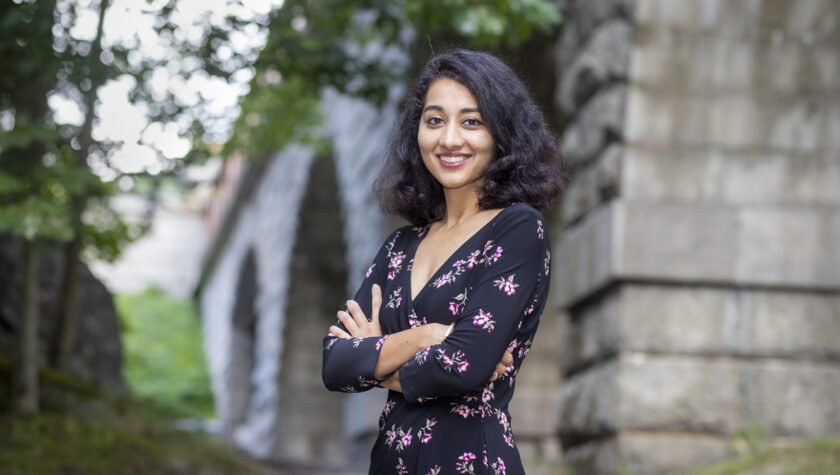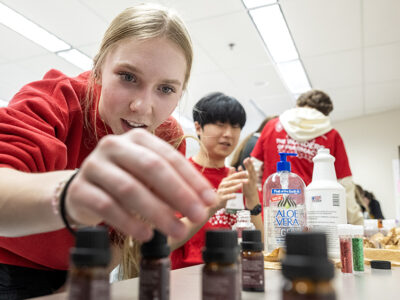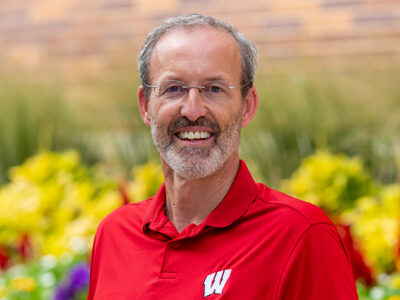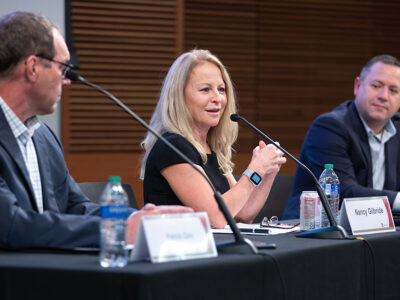
14
September

Alum Sonal Ghura incorporates patient perspectives and experiences into the approval process for new therapies
By Katie Ginder-Vogel
Photos by Carla Osberg
Before a new drug ever hits the shelf in a pharmacy or hospital, it has many hurdles and tests to clear. At Takeda Pharmaceuticals, when new therapeutics for neurological conditions are in their infancy, Sonal Ghura (PhD ’16) is one of the influences on their future.
“My job is to decide what kind of research we need to do to get U.S. Food and Drug Administration and European Medicines Agency approvals for pipeline molecules,” says Ghura, an alum of the University of Wisconsin–Madison School of Pharmacy’s Social and Administrative Sciences in Pharmacy program. “My job is to make sure the patient voice gets incorporated into whatever Takeda does.”
For example, her team might need to learn more about certain symptoms of multiple sclerosis or about caretakers for people with Alzheimer’s disease. And then it’s Ghura’s job to develop a research plan to gather that data, whether it’s through including certain aspects in clinical trials, surveys, or focus groups.
“Answering patient-focused outcomes questions is my calling to pharma and to Takeda.”
—Sonal Ghura
“It is extremely helpful to hear from patients and clinicians,” she says.
She joined Takeda Pharmaceuticals in May 2021, as associate director in the global evidence and outcomes division for the neurology team.
“I am very excited and think it’s the natural progression of my PhD,” says Ghura. “Answering patient-focused outcomes questions is my calling to pharma and to Takeda.”
Research journey
Ghura came to UW–Madison to earn a PhD after completing a pharmacy degree in India. She knew she wanted her research to stay in the realm of patient care and medication expertise, while incorporating patient perspectives to improve public health outcomes. School of Pharmacy Professor Betty Chewning, who became her mentor, was a perfect fit.
“I chose Madison for Betty,” Ghura says. “I knew I wanted to research and contribute to this space.”
Ghura interviewed with Chewning and Henry Young, who was a professor in the School’s Social and Administrative Sciences (SAS) Division from 2005 to 2013, and found them to be down-to-earth people — the kind she’d like to spend the next few years of her life getting to know.

“The people called to me even more than the research — the city, the people, everything,” says Ghura. “I knew coming to Madison was a really good decision.”
Chewning became Ghura’s advisor, providing support when needed but letting Ghura make her own research decisions, and remains a friend and colleague.
“It was everything I hoped it could be and more,” Ghura recalls. “Betty trusted my instincts and was a very thoughtful colleague.”
As a graduate student, Ghura did an internship at Health Literacy of Wisconsin, where she worked on increasing the readability of prescription labels. Through that project, she got to know Olayinka Shiyanbola, an associate professor in the SAS Division.
“We published a lot out of that,” says Ghura, adding that it was one of her favorite projects.
Ghura says her experience in graduate school made her realize that exploring career options early in undergraduate or graduate school can be useful. Now, she advises students to be intentional about their career searches and to use what they learn to choose courses.
“The world is very dynamic, and it’s crucial to see what skills should be prioritized to succeed,” she says. “Talk and network with students outside of your school atmosphere to really get a flavor of all the possibilities out there.”
Patient connection
When Ghura graduated in 2016, with a minor in sociology, she looked into research and consulting. As luck would have it, Shiyanbola had a connection at Evidera, who shared an opening.
Ghura got the job and spent the next four and a half years there as a research associate in the company’s patient-centered research division.
“I feel passionate about healthcare and patients, and they had that in their mission statement, which drew me to them,” says Ghura. “There are good people at the organization, who have been academics and have done good research in the patient healthcare space, so it seemed like a good group to join, contribute to, and learn from.”

At Evidera, Ghura specialized in PRO (patient-reported outcomes) development and validation for use in clinical trials, to help measure meaningful outcomes to patients. She also did research on patient preference studies, medication adherence, and health utility assessments. Her research helped pharmaceutical clients meet their goals for regulatory audiences, payers, and clinicians.
“I did mostly research, some project management, and a lot of client interfacing,” Ghura says. “The space I was in was health economics outcomes research (HEOR). The skills and the capabilities I learned at UW–Madison helped me greatly.”
Her proudest career moment to date came from an experience doing research on a rare disease in children. As a mother herself, Ghura says she has a soft spot for pediatric patient needs.
“We did research with kids before they were given the intervention and after impact, and the profoundness of the impact on the children’s parents was heartwarming,” Ghura says. “Parents were crying with joy. I was so happy to be part of a project like that. You don’t have to be leading it, just privy to it.”
Ghura was promoted twice at Evidera before she began thinking it was time to move into a more strategic role in industry. She joined Takeda Pharmaceuticals’ neuroscience team as an associate director in the global evidence and outcomes division.
Ghura says that companies like Takeda are empowered and motivated to use patient outcomes-related data.
“Decision-makers like the FDA want to include the patient voice in making sure clinical trials are reflective of the actual experience of the disease,” says Ghura. “Pharma companies are trying to invest heavily in this field of outcomes research because if they want their molecule approved for market use, they need to ensure compliance with the FDA.”
“Anybody in my shoes can really strategize and direct the progress of molecules in directions that benefit patients. It’s an exhilarating opportunity.”
—Sonal Ghura
She works on a team of seven other PhDs in health economics research, who closely work with larger clinical, pre-clinical, and commercial teams to strategize the advance of the neuroscience molecules in Takeda’s pipeline.
“You could visualize this as a setting a dining table, when several people work on setting the table, cooking, saying grace and then finally eating together,” she says.
Although she’s been in the new role for only a couple of months, she’s optimistic of what she and her team can accomplish.
“Anybody in my shoes can really strategize and direct the progress of molecules in directions that benefit patients,” says Ghura. “It’s an exhilarating opportunity.”







